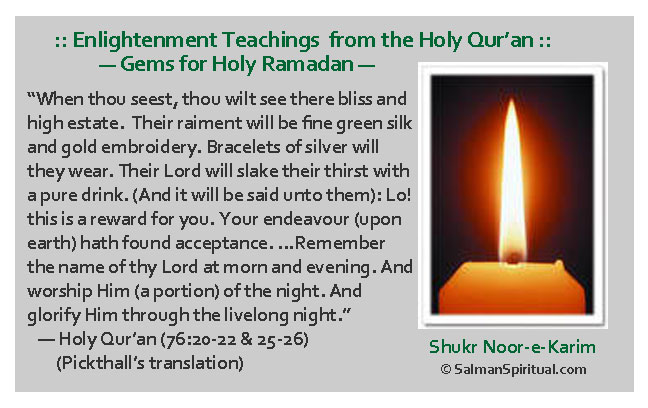

"Praise be to Allah, Who hath created the heavens and the earth, and hath appointed darkness and light." — Holy Qur'an 6:1
:: Trait No. 29: A Dā'ī Should Love Knowledge and Those Who Have It ::
Thursday,
Jan. 22, 2026
Bismillahir Rahmanir Rahim
In the name of Allah, the Most Beneficent, the Most Merciful.
Ya Ali Madad and Ramadan Mubarak. This post consists of five parts
Part 1: Enlightenment Teachings from the Holy Qu'ran

Part 2: An excerpt from 'A Code of Conduct—A Treatise of the Etiquette of the Fatimid Ismaili Mission'
In 'al-Risāla al-mūjaza al-kāfiya fī of Ahmad b.Ibrāhīm al-Naysbūrī has written the following gem:
"[§64] Thus a dâ'î should love knowledge and those who have it. People will deduce from his love of the learned that he is one of them, and that he is himself a scholar and that he believes and considers true the knowledge that he relates, and [that] they therefore accept from him. It is essential that a dâ'î hold most of his sessions with the learned because, if he is himself a scholar, he will increase his own knowledge from them and they will also learn from him, and if he is not, he will learn from them even so. Should he err in some aspect of knowledge, they are better to correct his mistake than his antagonists who will seize on his error and make out of it an argument against him. When his sessions are held with the learned, he takes up with them matters for deliberation and inquiry that need to be studied and have their implications set forth by bringing to bear efforts of thought and study. God said: 'God will raise up in rank those of you who believe and have been given knowledge.'77 This message applies to the ranks of mukâsir to bâb, because all of them are dâ'îs to those below them, who are each potentially what they are themselves, and the aim is for the lower to attain the higher rank in actuality. God has said: 'Those of His servants who truly fear God are the learned.'78 "
(Source: Klemm, V. and Walker, P. E., A Code of Conduct—A Treatise of the Etiquette of the Fatimid Ismaili Mission, p.55)
Footnotes
77. Qur'an, 58:11.
78. Qur'an, 35:28.
Part 3: Dhikr Tasbi
Let us recite the Yâ Rahmân, Yâ Rahim tasbi to appreciate the Lord's kindness and mercy upon the individual personal worlds of all human beings.
Bismillahir Rahmanir Rahim
In the name of Allah, the Most Beneficent, the Most Merciful
Ya Rahman, Ya Rahim
O the Most Kind and the Most Merciful Lord
of individual personal worlds of all human beings
Al-hamdu lillahi rabbil 'alamin.
Praise be to Allah, the Lord of the worlds!
Part 4. Angelic Salwat
Let us recite angelic salwats to invoke Divine grace and mercy.
Bismillahir Rahmanir Rahim
In the name of Allah, the Most Beneficent, the Most Merciful
Allâhumâ salli alâ Muhammadin wa âle Muhammad:
O Allah! Bestow Peace on and through Muhammad and his Descendants
or
Al-hamdu lillahi rabbil 'alamin.
Praise be to Allah, the Lord of the worlds!
Part 5. Ardent Global Prayers
O Noor Mowlana Hazar Imam: bless the global Jamat with spiritual and luminous tayid (help) to advance materially, spiritually and intellectually; and create sunshine in our hearts and bless all of us with the inner vision of the Truth.
Haizinda — Qayampaya
(Our Present Imam is Living and His NOOR is Eternal)
Traits of an Ismaili Dai